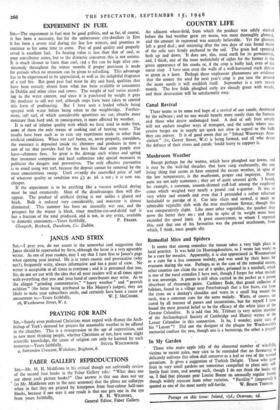EXPERIMENT IN FUEL
Sm,—The experiment in fuel may be good politics, and so far, of course, it has been a necessity, but for the unfortunate city-dwellers in Eire it has been a severe trial during the last few winters, and promises to continue so for some time to come. Peat of good quality and properly saved is excellent fueL Its heating value is less than that of coal, as your contributor states, but to the domestic consumer, this is not serious. It is much cleaner to burn than coal, snd a fire can be kept alive con- tinuously throughout the winter months if proper provision is made for periods when no attention can be given to refuelling. This advantage has to be experienced to be appreciated, as well as the delightful fragrance of a turf fire. But good peat fuel must be dry and hard, qualities that have been entirely absent from what has been available to consumers in Dublin and other cities and towns. The weight of turf varies accord- ing to the water content, and since it is purchased by weight it pays the producer to sell wet turf, although steps have been taken to control this form of profiteering. But I have seen a loaded vehicle being sprayed with water before being taken to the weighbridge. Further- more, soft turf, of which considerable quantities are cut, absorbs more moisture than hard and, in consequence, is more affected by weather.
It is turf of inferior quality with which we have tried to make fires, some of them the only means of cooking and of heating water. The results have been such as to ruin any experiment made in other than artificial conditions. When wet turf burns, or, more properly, smoulders, the moisture is deposited inside the chimney and produces in time a sort of tar that provides fuel for the best fires that some people ever have—chimney fires. So great is the damage each winter and spring that insurance companies and local authorities take special measures to publicise the dangers and preventives. The only effective preventive is to avoid using wet turf, because the deposit cannot be removed by the most conscientious sweep. Until recently the controlled price of turf of whatever quality or condition was £3 4s. 5d. a ton ; it is now to& cheaper.
If the experiment is to be anything like a success artificial drying must be used extensively. Most of the disadvantages then will dis- appear. The product of artificial drying is not unlike a glazed red brick. Bulk is reduced very considerably, and moisture is almost eliminated. This summer has been an unusually wet one, and the prospect for the winter is bleak, since machine-cut-and-dried turf is but a fraction of the total produced, arid is not, in any event, available to domestic consumers.—Yours faithfully, P. FRASER. Glengesh, Roebuck, Dundrum, Co. Dublin.


























 Previous page
Previous page